Article and photos by MARGIE O’LOUGHLIN
The Minnesota Governor’s Candidate Forum on the New Environment was held Jan. 24, at Hamline University’s Anne Simley Theatre. The six leading Democratic candidates for governor took the stage on a Wednesday evening in a forum hosted by 25 of the state’s leading environmental and conservation groups.
Regarding the absence of GOP candidates, Sarah Wolff, advocacy director for Minnesota Environmental Partnership, said, “We were very disappointed. We invited the six GOP candidates who had shown the most traction in their candidacies; three declined outright, and three did not respond.”
“The forum was called ‘Our New Environment’ for several reasons,” Wolff said. “The seriousness of environmental and conservation issues is increasing in our state. We have two high impact projects being considered right now: the Line 3 Pipeline and the PolyMet Mine. And, of course, things have changed dramatically on the national front with the Trump administration’s actions.”
The public was asked to submit questions in five categories, or vote for their favorite question already posted online. The categories of questioning include air and climate, land, water, legacy and funding, and cross-cutting issues.
Here are the questions addressed at the forum:
—What should be the state’s role in acquiring land to protect habitat as well as hunting, fishing, and recreational opportunities?
—Do you think that the current draft permits for Polymet, including DNR’s Permit to Mine, adequately protect MN waters, downstream communities, and taxpayers? Do you support this project as proposed?
—Cropland runoff is the largest source of pollution to MN’s waters, and we’re not making progress. What will you do to accelerate the incorporation of water-friendly perennial crops and cover crops?
—Since 2001 the state commitment of General Fund dollars for environment and conservation has dropped from a consistent 2% of the budget to less than 1%. Would you work to reverse this trend? How?
—MN environmental problems fall disproportionally on people of color, tribal communities and people with low incomes. As Governor, what steps would you take to address these disparities?
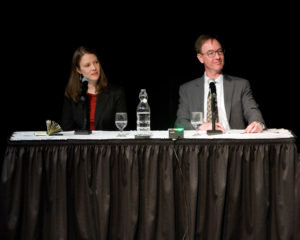 Photo right: The forum was co-moderated by Elizabeth Dunbar, who covers the environment for Minnesota Public Radio, and Dave Orrick, who reports on state government and politics for the Pioneer Press. More than 200 people heard the forum live, and it was streamed online to eight public satellite locations throughout the state.
Photo right: The forum was co-moderated by Elizabeth Dunbar, who covers the environment for Minnesota Public Radio, and Dave Orrick, who reports on state government and politics for the Pioneer Press. More than 200 people heard the forum live, and it was streamed online to eight public satellite locations throughout the state.
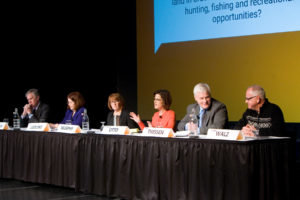 Photo left: Participating in the forum were (left to right): former St. Paul Mayor Chris Coleman, State Representative Tina Liebling, State Representative Erin Murphy, State Auditor Rebecca Otto, State Representative Paul Thissen and U.S. Congressman Tim Walz.
Photo left: Participating in the forum were (left to right): former St. Paul Mayor Chris Coleman, State Representative Tina Liebling, State Representative Erin Murphy, State Auditor Rebecca Otto, State Representative Paul Thissen and U.S. Congressman Tim Walz.
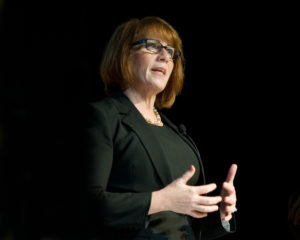 Photo right: Erin Murphy is a registered nurse and six-term legislator who works at the intersection of healthcare and politics. She said, “I became a nurse because I care about people. I went into politics for the same reason.” Of the PolyMet Copper Nickel Mine proposed for Northern Minnesota, she said, ”When we’re pitting jobs against water—water should win.”
Photo right: Erin Murphy is a registered nurse and six-term legislator who works at the intersection of healthcare and politics. She said, “I became a nurse because I care about people. I went into politics for the same reason.” Of the PolyMet Copper Nickel Mine proposed for Northern Minnesota, she said, ”When we’re pitting jobs against water—water should win.”
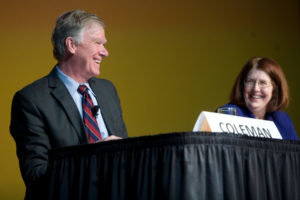 Photo left: Chris Coleman (on left), three-term mayor of St. Paul said, “During my tenure in City Hall, we made environmental issues and sustainability top priorities. We have an environmental quality here in Minnesota that most states envy. We will have to fight like mad to keep it that way.” Tina Liebling (on right) is a seven-term legislator from the Rochester area. She describes herself as a bold progressive, and the first DFL candidate ever elected from Olmstead County. She supports returning the percent of the state’s general fund dedicated to environmental issues to 2%, or more if that’s what it takes, to address the issues adequately. The dollar amount has slipped below 1% in recent years.
Photo left: Chris Coleman (on left), three-term mayor of St. Paul said, “During my tenure in City Hall, we made environmental issues and sustainability top priorities. We have an environmental quality here in Minnesota that most states envy. We will have to fight like mad to keep it that way.” Tina Liebling (on right) is a seven-term legislator from the Rochester area. She describes herself as a bold progressive, and the first DFL candidate ever elected from Olmstead County. She supports returning the percent of the state’s general fund dedicated to environmental issues to 2%, or more if that’s what it takes, to address the issues adequately. The dollar amount has slipped below 1% in recent years.
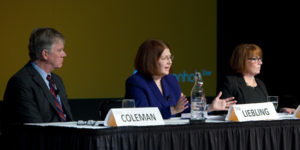 Photo right: Three-term State Auditor Rebecca Otto (left) exemplifies her commitment to the environment by having built her own energy efficient, solar-powered home, and driving an electric vehicle. Her Minnesota-Powered Plan proposes to create between 70,000 and 250,000 high-paying permanent clean energy jobs throughout Minnesota, revitalizing our economy without raising taxes. Legislator Paul Thissen (center), a former speaker of the Minnesota House, said, “From my perspective, the two greatest issues we face today are climate change and Minnesota’s standing as the state with the second worst racial disparities in the country. I believe these two things are closely related.” U.S. Congressman Tim Walz (right) has also been an award-winning social studies teacher and national guardsman—the most highly decorated soldier in the US Congress. He has served in Congress since 2006. Of the Enbridge Energy Line 3 Pipeline (proposed to carry 760,000 barrels of Canadian tar sands oil/day across Minnesota), he said,”I oppose this project because climate change is an emergency. The Line 3 technology is outdated, and delays the inevitable.”
Photo right: Three-term State Auditor Rebecca Otto (left) exemplifies her commitment to the environment by having built her own energy efficient, solar-powered home, and driving an electric vehicle. Her Minnesota-Powered Plan proposes to create between 70,000 and 250,000 high-paying permanent clean energy jobs throughout Minnesota, revitalizing our economy without raising taxes. Legislator Paul Thissen (center), a former speaker of the Minnesota House, said, “From my perspective, the two greatest issues we face today are climate change and Minnesota’s standing as the state with the second worst racial disparities in the country. I believe these two things are closely related.” U.S. Congressman Tim Walz (right) has also been an award-winning social studies teacher and national guardsman—the most highly decorated soldier in the US Congress. He has served in Congress since 2006. Of the Enbridge Energy Line 3 Pipeline (proposed to carry 760,000 barrels of Canadian tar sands oil/day across Minnesota), he said,”I oppose this project because climate change is an emergency. The Line 3 technology is outdated, and delays the inevitable.”
Comments
No comments on this item Please log in to comment by clicking here